It’s the time of the year again when the new collection for nani IRO fabrics ship. And this year there is another reason to be excited. After 10 years, she has finally released a new sewing pattern book! (You can read the review of the first book here. )
All the fabrics used in the book are from the new nani IRO 2018 collection. I will be going writing up on that once I get my hands on the fabric. And since we will be practically talking about nani IRO collection the whole month, I would like to declare this month of March 2018 – nani IRO month again!
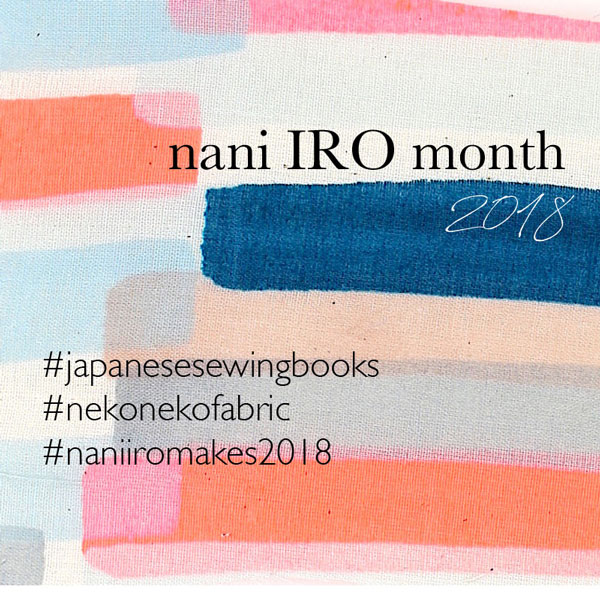
I first came up with this idea back in March 2013 where I dedicated the entire month to nani IRO related posts, and oh my has it been 5 years already??? What will I be doing for nani IRO month? First of all, this book review, followed by a post on the new collection this year, and finally my very own makes!
In the meantime, let’s get inspired and hopefully this will help you decide which fabrics to get too! (If you haven’t ordered already)

This time round it’s for ladies only. Sizes S, M&L, L+ and 2L are included. It’s a little confusing, but I will explain later with the size chart at the end of the book review.

There are patterns for tops, pants, skirts, dresses, pantsuit, hats, coats and shirts. Well practically everything. It is the Sewing Closet book after all!
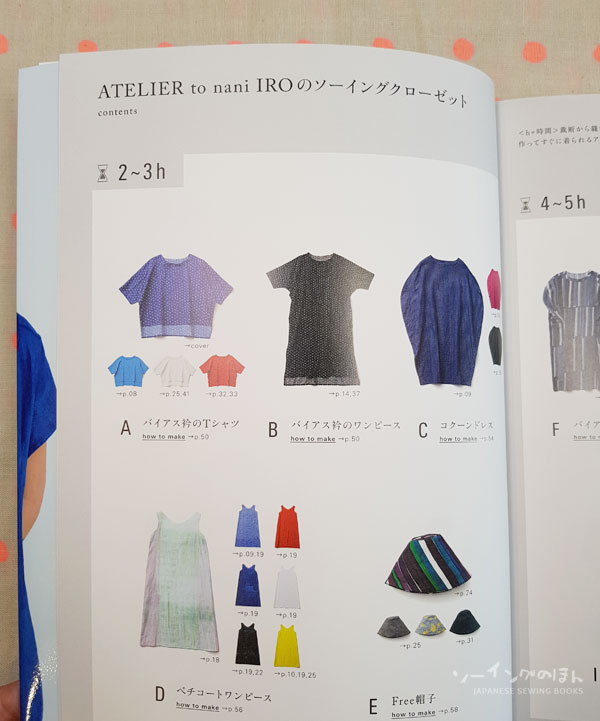
The projects are grouped based on difficulty of making – as indicated by the approximate number of hours you will need to make the garment.
A – Bias collar Tshirt
B – Bias collar Dress
C – Cocoon dress
D – Petticoat dress
E – Free Hat
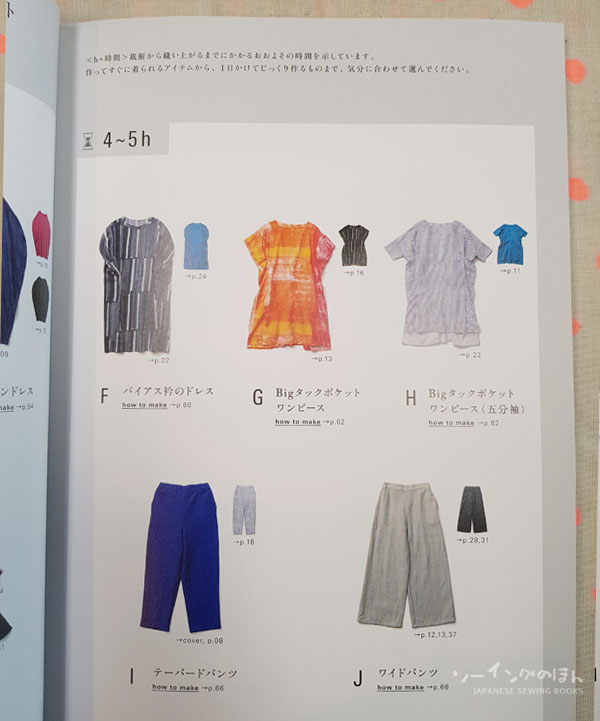
F – Bias Collar Dress
G – Big Tuck Pocket Dress
H – Big Tuck Pocket dress with half sleeves
I – Tapered pants
J – Wide Pants

K – Tuck Silhouette Dress
L – Side pocket Long Skirt
M – All in one
N – Work Dress

Q – Spring Summer Staff Coat
R – Autumn Winter Staff Coat
O – Work Dress (3/4 sleeves)
P – Work Shirt
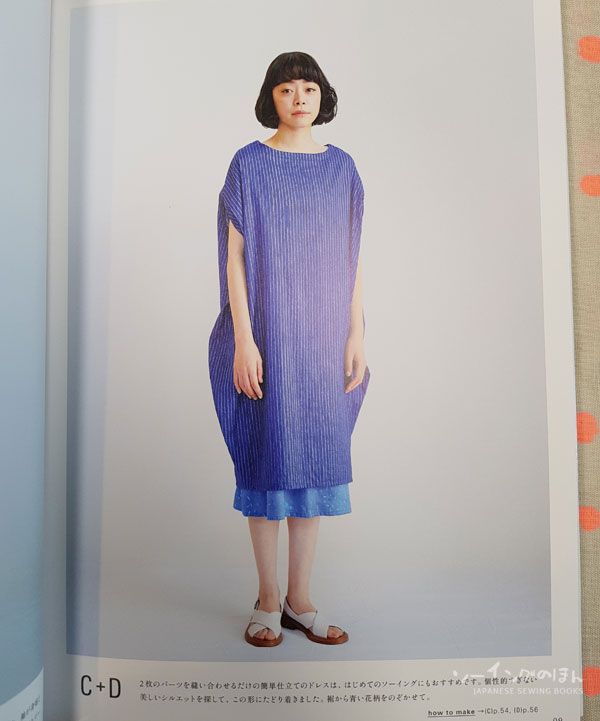
The outfits for each page are labelled below. Here is the Cocoon dress with the petticoat dress worn underneath. The main fabric on the dress is Camino in Double Gauze.

Big Tuck Pocket Dress in Grace (Linen)

Dress G in Ripple (Linen)

Dress K in Situation (cotton sateen)

M – All in One. This is basically like a pant suit. It is quite interesting and looks cool on the model. But I’m not so sure I can pull off the look myself 😛 The fabric is Situation (Linen)
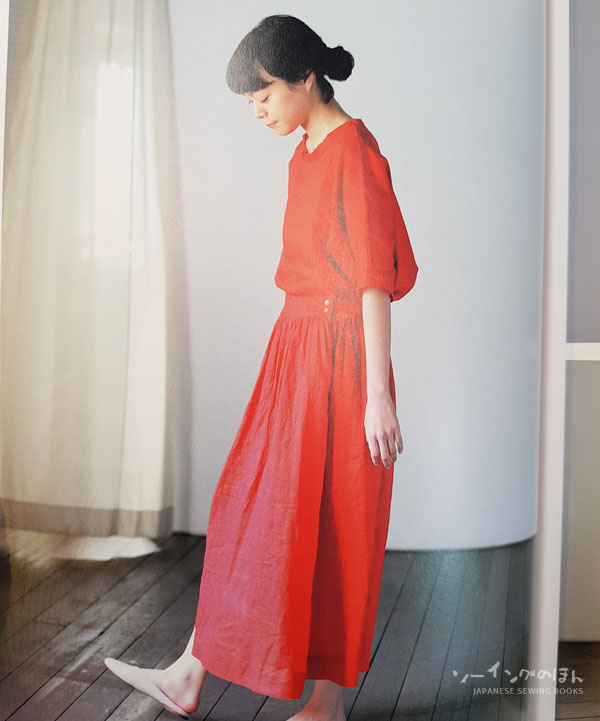
Other than prints, there is a range of solid color fabrics under the new range – Naomi Ito Colors. You can find many different subtrates here – Linen Cotton, Cotton Sateen, Cotton Linen Herringbone, Linen, Cotton Linen Brushed Herringbone (something like the the wool used for men’s suits). The above skirt with side buttons, is made using the solid Linen color – French Red.

One of my favourite designs – Fuccra Rakuen is released in new colors and substrates this season. Seen here is the blue linen version, made into skirt L.

Work shirt in Camino linen.
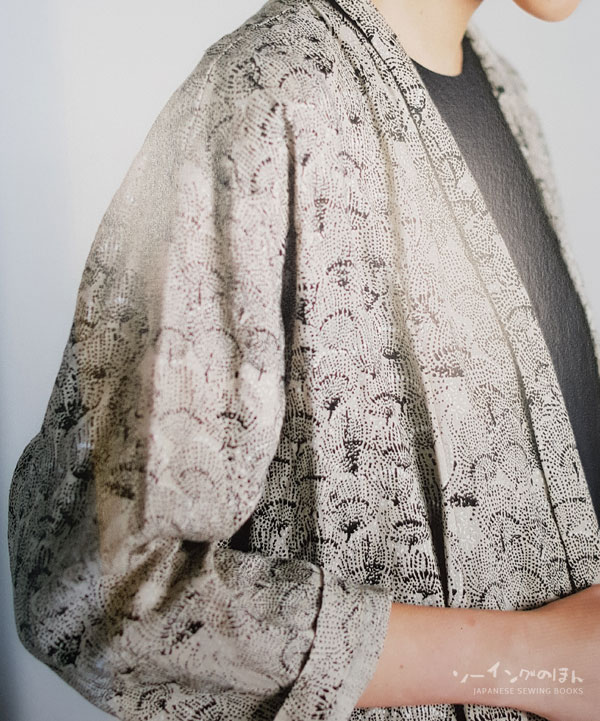
Another one made using Situation linen – this is a lightweight coat for Spring/Summer.
Some pictures of the Atelier to nani IRO in Osaka. If you ever have the chance to visit and need directions, see my blog post here – Directions to Atelier to nani IRO
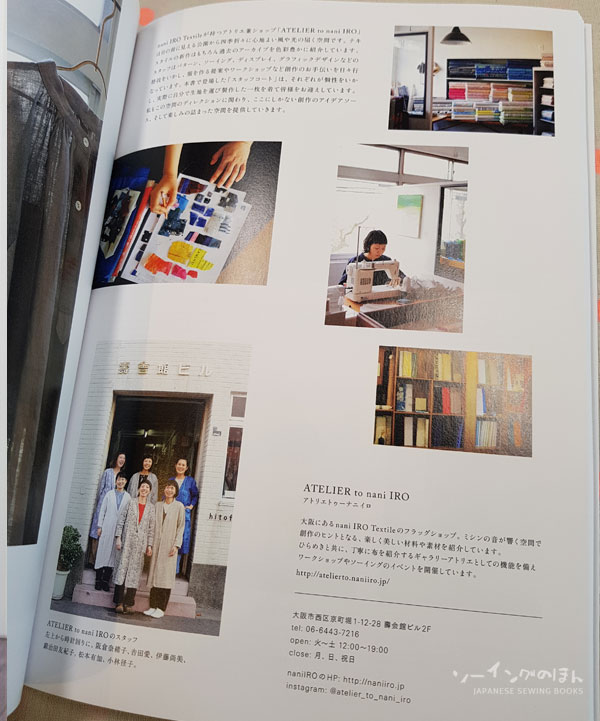
and now for the size chart. I’ll translate the important information below to help you decide which size is best for you.

Choosing the right size
* The attached pattern sheets are for the 4 sizes – S/M&L/L+/2L
* Some items may be grouped into 3 different sizes S/ M&L, L / 2L
or grouped into 2 sizes
– sizes S / M&L, L+, 2L
– S, M&L, L / 2L
Size table (units in cm)
Japanese Text in Left most column
Body part / Size
Height
Bust
Waist
Hip
Confusing??? ![]() I was confused too… until I looked at the pattern sheets. Basically, first find out which size you belong to, first refer to the size table (above). You will notice there are overlaps in some of the measurements for some of the sizes. My guess is that it is done this way because most people don’t fall neatly into a particular size, so the table gives you a better idea if you should choose one size up or down based on all of your measurements.
I was confused too… until I looked at the pattern sheets. Basically, first find out which size you belong to, first refer to the size table (above). You will notice there are overlaps in some of the measurements for some of the sizes. My guess is that it is done this way because most people don’t fall neatly into a particular size, so the table gives you a better idea if you should choose one size up or down based on all of your measurements.
The next thing to note is that, not all the pattern sheets come in the 4 sizes listed above in the table. Certain items have patterns that come in 2 sizes and some in 3 sizes – which means that some of the sizes are grouped into one pattern sheet.
For example, the first pattern A – bias neck T shirt, comes with 2 pattern sizes only. Sizes S, M&L and L+ make use of the smaller pattern, and size 2L uses the larger pattern.
The second example is more straightforward F- Bias neck dress – this comes in 4 separate sizes patterns, S / M&L / L+ / 2L.
The 3rd example is N – Work Dress. This comes in 3 sizes. S / M&L, L+ / 2L
The easiest way to tell is from the material list in the how-to-make pages. If there are 2 sets of numbers, there are 2 pattern sizes, and so on… The other way is to look at the sizes separated by the backslashes. I don’t know why it has to be so confusing… but that’s just the way it was written.
There are many more garments in the book that I could not post here, so have a look at the book flip-through video!
Title : Atelier to nani IRO’s Sewing Closet
Author : Naomi Ito
ISBN Number : 978-4579116270



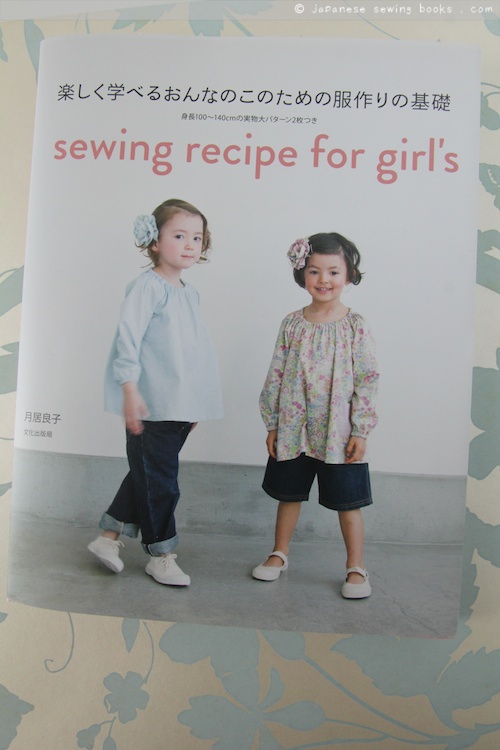

6 Comments
I really like several of the designs in this book. Thanks for the review!
Hi. I’d like to make a translation request for pattern O of this book. I’d actually like to make shirt P, the shorter version of dress O, and the first four P instructions refer back to O. Specifically, I’m unsure about the gathering specs around the placket and neckline. Thanks. Is there someplace on the site to make a translation request? If so, oops, sorry.
Hi Frances, Sure! I will do a translation of the first 6 steps which are common to O and P. I will post it up on the blog next week!
[…] looks like dry roller paint streaks. The following dress G from the latest sewing book – Atelier to nani IRO’s closet, is made using this very same fabric. See how the border adds a interesting effect to the […]
[…] All images from http://naniiro.jp/ and the book – Atelier to nani IRO’s sewing closet […]
Forgot to say – love your website – it is a great service to us who do not understand written Japanese. I do my best with the pictures, but sometimes – it’s just not doable.
For example, I so want to tackle the jumper in Nani Iro’s latest book – M – but there are some steps that just aren’t clear such as step # 3 – the closures – how does this thing close – I don’t understand 🙂